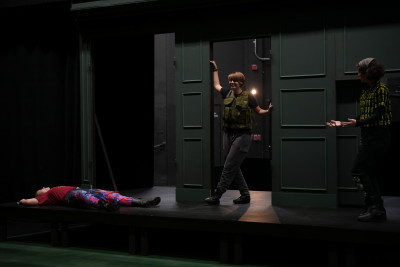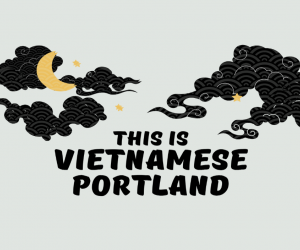main content Native Scholars Present Shakespeare’s ‘Henry IV, Part 1’
Henry IV, Part 1 opens November 3. Directed by Native Scholar-Artist in Residence Waylon Lenk BA ’08, the production features a modern translation by Native playwright Yvette Nolan, which aims to ease viewers into the powerful historical tale.

by David Oehler BA ʼ14
This fall, the Lewis & Clark College theatre department presents Yvette Nolan’s translation of Shakespeare’s Henry IV, Part 1 on the main stage.
Directed by Shakespeare scholar Waylon Lenk BA ’08 as part of the inaugural Native Scholar-Artist in Residence program, the translation seeks to remove obstacles to audience enjoyment of Shakespeare. It updates antiquated language to more modern English, while retaining the meaning, complexity, and ambiguity of the play’s depictions of historical figures.
“I don’t think anybody listening to Shakespeare understands it 100 percent of the time. By the time you figure out what you just heard, a whole bunch of new stuff has happened,” says Lenk. However, this isn’t a reimagining of the play. “There’s a lot of stuff that doesn’t need to be translated, because it still works for our modern ears. And there’s some stuff that we think Shakespeare actually meant to be opaque.”

Despite the heroic connotations, Lenk says this is meant to be a play about masculinity and its relationship to violence. “I don’t think we should do war plays that valorize violence. I think if we’re going to do violence on stage, it has to make the audience uncomfortable. The idea is that there’s this homogenous group of men that are doing war, who don’t know how to relate to themselves, to their communities, or their land in a healthy way.”
“I loved, or thought I loved, Hal,” says translator and playwright Yvette Nolan about what she learned during this process. “I thought this was a play about how we become leaders … about the making of a king, which it kind of is, but it is not necessarily the kind of king I would want. Hal is manipulative and cruel.”
While this version of Henry IV, Part 1 contains no alterations from the source in terms of plot and structure, the Native identities of the playwright and director are always present and “bleed into our approach to the text,” says Lenk.
“Yvette brings a sensibility that is present in much of her art regarding masculinity and violence, some of which she has explored in relation to Indigenous communities,” says Lenk.

Credit: Suhail Akram BA ’24Although the play addresses weighty themes, audiences should expect some levity to offset the seriousness. “We’ve got an amazing movement director, Claire Aldridge, to help us deliver the violence but also the silly clownery,” says Lenk.
“When it is really working, the audience forgets that it is a translation. They think it is the original Shakespeare, and he is just that clear,” says Nolan. “They don’t get thrown out of the play by either archaic or contemporary language—they just get swept away by the story being told clearly.”
Henry IV, Part 1 will run November 3 and 4 at 7:30 p.m., November 5 at 2 p.m., and November 9, 10, and 11 at 7:30 p.m. Tickets may be purchased online or in person at the box office.
More Stories

Textual Treasures
Paging Through the Past
In her Medieval Manuscripts course, Professor of English Karen Gross brings history to life with the help of Watzek Library’s rich archival collections. Students get hands-on experience with centuries-old texts as they explore the art of archival research.

Dance Moves
NYC-Based Dance Company In Step With L&C Students
The Tiffany Mills Dance Company, named for and headed by L&C’s director of dance, took part in a spring residency on campus, leading a series of community dance workshops and performing The Viola Trilogy alongside students.

Groundbreaking Science
A Quantum Leap for Physics Students
Ben Olsen, assistant professor of physics, is establishing Lewis & Clark’s first Quantum Information Science and Engineering lab to probe how unusual types of matter behave at the subatomic level. But first he and his students have to build “The Apparatus.”

Immersive Learning
Voices of Vietnamese Portland
Nhân Hàn BA ’27 and Thoan Nguyễn BA ’27, with project manager Zoë Maughan BA ’19, curated a 15-panel, bilingual traveling exhibit highlighting stories from Vietnamese Portland: Memory, History, Community, an archive documenting experiences of Vietnamese Portlanders.
